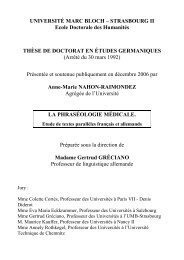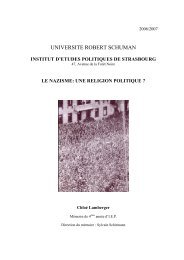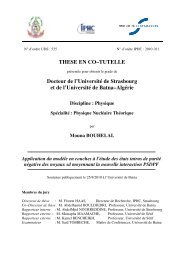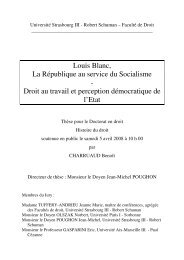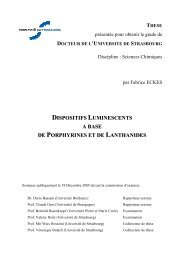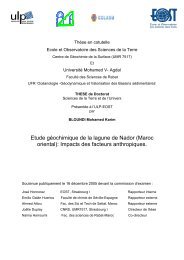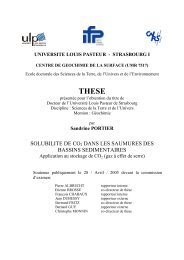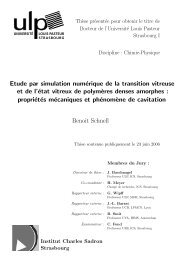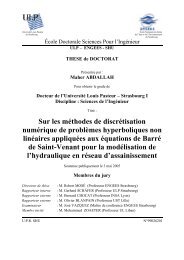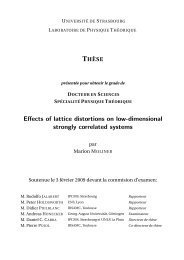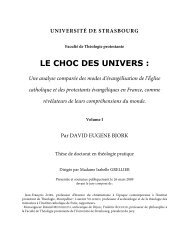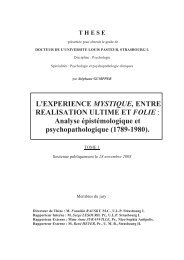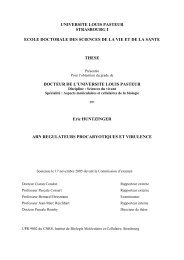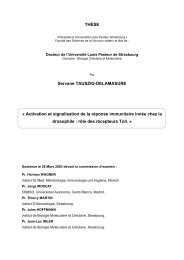Économie Évolutionniste et Culture d'Entreprise
Économie Évolutionniste et Culture d'Entreprise
Économie Évolutionniste et Culture d'Entreprise
You also want an ePaper? Increase the reach of your titles
YUMPU automatically turns print PDFs into web optimized ePapers that Google loves.
s’en trouverait alors gravement affectée. Ce passage traduit ce que Nelson <strong>et</strong> Winter avaient réellement en<br />
tête :<br />
[I]t is necessary that the individual who will occupy that role in the new plant acquire the knowledge required for its<br />
performance. This may be accomplished by having that individual observe or be actively trained by the incumbent to the new<br />
system and leaving his trained successor in the old one. The collection of new role occupants thus created will make a<br />
coordinated, routinely functioning productive organization of the new facility, because the roles were coordinated in the old<br />
one - provided that the copying of the individual roles is accurate enough. (Nelson <strong>et</strong> Winter, 1982, p. 120).<br />
Exercer un rôle organisationnel implique l’acquisition d’une connaissance reliée à un cadre<br />
organisationnel particulier. L’approche de Nelson <strong>et</strong> Winter privilégie une vision consensuelle de<br />
l’organisation. En légitimant une distribution asymétrique du pouvoir sur une durée relativement longue<br />
(Cohen <strong>et</strong> al., 1996), c<strong>et</strong>te vision évacue de l’analyse la figure de l’entrepreneur <strong>et</strong> les problèmes de<br />
contrôle :<br />
The general point here is that most organizational routines involve also the legitimation of an asymm<strong>et</strong>ric distribution of<br />
power. Hence, tog<strong>et</strong>her with the cognitive aspect of routines and their characteristics of truces, it is worth exploring their<br />
domination elements, whereby, paraphrasing Max Weber, the content of the command becomes a natural and automatic<br />
response of “ruled” agents. (Cohen <strong>et</strong> al., 1996, p. 20).<br />
Nous observons donc avec Nelson <strong>et</strong> Winter un glissement du débat d’une vision politique de la firme, où<br />
le conflit prédomine, à un univers de coordination où la variable cognitive prévaut. La trêve perm<strong>et</strong> de<br />
neutraliser les comportements dits discrétionnaires <strong>et</strong> contribue au maintien du statu quo, d’où la tentation<br />
de ne regarder les routines que sous leur angle opérationnel en oubliant les mécanismes sociaux <strong>et</strong><br />
historiques qui ont contribués à leur émergence (Lazaric, 2000). Or, ignorer la co-évolution des variables<br />
politiques <strong>et</strong> cognitives est une vision très parcellaire de l’apprentissage collectif. Jacoby (2001) souligne<br />
le degré auquel les conflits d’intérêts dans le partage du surplus sont passés sous silence par Nelson <strong>et</strong><br />
Winter à travers leur recours à l’hypothèse forte du mécanisme de trêve organisationnelle :<br />
Everyone wishes to receive from his or her participation in the firm’s activity the most profit possible, that is, at least a part of<br />
the surplus equal to his or her participation, since an individual’s incentive to pursue his or her activity depends on this<br />
equation. With the truce hypothesis, it is no longer a question of knowing how economic agents are going to arbitrate within<br />
the firm, for this hypothesis posits that potential conflict b<strong>et</strong>ween members is solved de facto. The question of a potential intraorganizational<br />
equilibrium by internal negotiation never arises since the possibility of negotiation lies outside the field of<br />
analysis. The necessary conditions for this equilibrium are thus m<strong>et</strong> a priori. The truce hypothesis holds that member behavior<br />
is pre-programmed and responses pred<strong>et</strong>ermined. Responses as well as behavior, both stable over an extended period, are<br />
stored in the repertoire of each member. There is an organizational link inscribed in time which solves the problems of surplus<br />
sharing. All potential conflicts b<strong>et</strong>ween agents within the firm are excluded. The behavior of agents is s<strong>et</strong>: there can be no<br />
possible interaction b<strong>et</strong>ween them. (Jacoby, 2001, p. 10-11).<br />
En plus des conflits d’intérêt, Jacoby om<strong>et</strong> de souligner les conflits dans la vision du monde (Cf. chapitre<br />
5 <strong>et</strong> suivants) qui sont également voilés par le mécanisme de trêve. Dans la vie économique réelle, les<br />
dimensions cognitives <strong>et</strong> motivationnelles sont étroitement reliées. Les changements dans les relations<br />
sociales organisationnelles affectent nécessairement son comportement <strong>et</strong> donc sa performance. L’analyse



